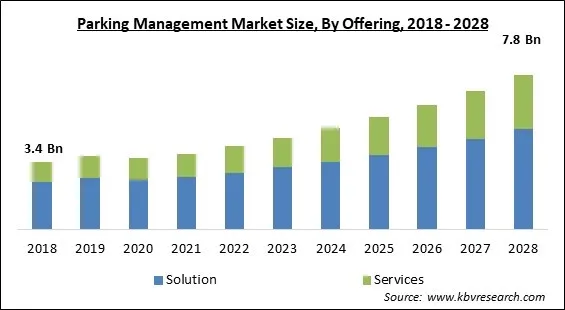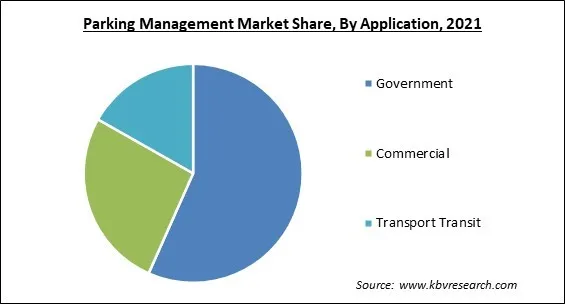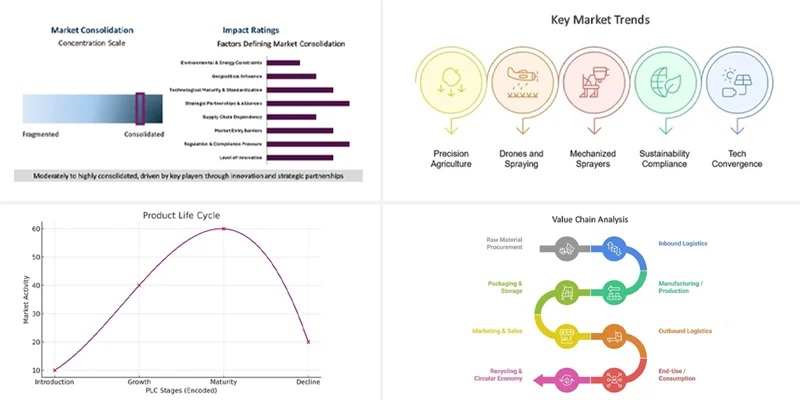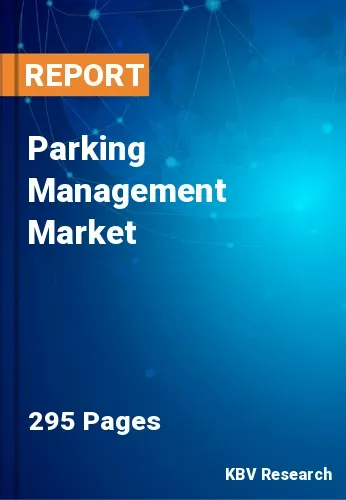The Global Parking Management Market size is expected to reach $7.8 billion by 2028, rising at a market growth of 10.9% CAGR during the forecast period.
Large cities across the world are aggressively using smart technologies to ease daily traffic and parking difficulties. Throughout history, both industrialized and emerging regions have encountered problems with traffic and parking. Smart parking technologies are revolutionizing parking lot management, and demand for these systems is on the rise.

The transportation system cannot function without parking. Parking accessibility affects how easily locations may be reached, which alters accessibility as a whole. Parking management refers to organizing and fully utilizing the resources available for parking cars. The parking of automobiles became challenging as a result of urbanization, and the development of infrastructure in metropolises, tier 2 and tier 3 cities, and towns. Additionally, despite an increase in car users, the available parking space isn't large enough to accommodate many vehicles. Planning for more practical and effective land-use changes and other land use management objectives are both supported by parking management.
Through sensors put in each parking area, parking management assists the vehicle in finding the available parking space. Managing parking costs and availability, particularly in busy and crowded areas, helps lessen the obstruction of adjacent corridors. The demand for safety, security, and connectivity as well as increased parking problems due to an increase in automobiles are significant drivers that are fueling the expansion of parking management.
For instance, T2 Systems, a provider of parking management solutions, introduced T2Mobile Pay, a browser-based parking solution, at Houston City Center in December 2021, so that customers could use this option quickly and simply pay for parking on their mobile phones. Customer satisfaction will rise as a result of this solution for mobile payments. Over the projected period, it is anticipated that these features would significantly enhance the demand for parking management solutions.
The majority of public organizations and municipalities rely on parking fees and other parking-related revenues to pay for several significant national citizen projects. To effectively conduct their commercial responsibilities, corporate buildings, central business districts, universities, shopping malls, hospitals, hotels, airports, and many more have excellent parking facilities and services. Hundreds of thousands of frontline staff are losing their jobs as many firms struggle to thrive. The dynamics of more than 2,000 parking facilities across North America are being continuously monitored, and observations are being made to better understand COVID-19's effects on parking on a quantitative level.
As developers end up constructing extra spots to comply with requirements governing the size and the number of parking spaces, a proportion of parking spaces stay vacant. By alerting consumers when and where a parking spot is available, continuous parking management solutions, such as enhanced signs and real-time parking signals, reduce the wastage of parking spaces. Through better revenue management, which combats overcharging and undercharging for parking spaces, parking management also leads to more effective use of parking resources. To maintain city infrastructure, use less space, generate more cash for the government, and improve user convenience, parking needs can be reduced by 20–40% using an efficient and comprehensive parking management solution.
Major urban areas are being transformed into "smart cities" as a result of the explosion of developing technology. Utilizing cutting-edge information and communications technologies, smart cities combine their housing, mobility, and economic activities. The adoption of smart city initiatives by governments throughout the world is anticipated to open up new markets for companies that offer smart parking management systems that can be connected with smart city solutions. Intelligent parking management systems can provide adaptable, scalable, manageable, and space-efficient parking solutions, which are needed by smart cities. Smart parking IoT solutions are a developing trend. Drivers have a range of possibilities, from subterranean sensors to AI robots.

Wireless and wired telecommunications systems, traffic control devices, a variety of hardware sensors, computer servers, and application interfaces are all included in parking management. The software and hardware used for parking management are incredibly diverse and variable. Additionally, to execute the idea of dynamic charged parking, parking data must be gathered an analyzed from various systems. It is challenging to combine the data from these separate parking data repositories, which are sometimes spread across incompatible hardware and software. The difficulty of integrating all of the technology and software used in parking management onto a single platform serves as a barrier to the market's expansion.
Based on Offering, the market is segmented into Solution (Revenue Management, Parking Reservation Management, Access Control, Security & Surveillance, and Valet Parking Management & Others) and Services. The services segment witnesses a significant revenue share in the Parking Management Market in 2021. It is due to the Large commercial organizations frequently using off-street parking management services to offer ample parking for their customers. Several companies are outsourcing services to third-party businesses to handle overall infrastructure maintenance. These companies provide the necessary expertise and perform maintenance work at regular intervals to avoid system failure.
Based on Application, the market is segmented into Government, Commercial, and Transport Transit. The government segment garnered the highest revenue share in the Parking Management Market in 2021. This is because public parking lots must be built throughout the city in a manner that is secure, sanitary, and effective. The government is undertaking several measures to lessen the strain on public property by effectively utilizing the resources at its disposal.
Based on Deployment Mode, the market is segmented into On-premise and Cloud. The cloud segment witnessed a substantial revenue share in the Parking Management Market in 2021. This is because cloud solutions are simple to deploy and don't need installing hardware. They're also simple to customize, allowing businesses to create solutions that are perfectly suited to their needs. Many businesses choose a model that allows them to scale up as needed because they would not want to invest much in infrastructure at first.
Based on Parking Site, the market is segmented into Off-Street and On-Street. The Off-street segment procured the largest revenue share in the Parking Management Market in 2021. As the number of cars on the road increases, infrastructure problems are occurring. Off-street parking is often preferred as it is a faster, easier, and more reliable solution, contributing significantly to traffic management.
| Report Attribute | Details |
|---|---|
| Market size value in 2021 | USD 3.8 Billion |
| Market size forecast in 2028 | USD 7.8 Billion |
| Base Year | 2021 |
| Historical Period | 2018 to 2020 |
| Forecast Period | 2022 to 2028 |
| Revenue Growth Rate | CAGR of 10.9% from 2022 to 2028 |
| Number of Pages | 295 |
| Number of Tables | 520 |
| Report coverage | Market Trends, Revenue Estimation and Forecast, Segmentation Analysis, Regional and Country Breakdown, Companies Strategic Developments, Company Profiling |
| Segments covered | Offering, Application, Deployment Mode, Parking Site, Region |
| Country scope | US, Canada, Mexico, Germany, UK, France, Russia, Spain, Italy, China, Japan, India, South Korea, Singapore, Malaysia, Brazil, Argentina, UAE, Saudi Arabia, South Africa, Nigeria |
| Growth Drivers |
|
| Restraints |
|
Based on Regions, the market is segmented into North America, Europe, Asia Pacific, and Latin America, Middle East & Africa. The Asia Pacific region garnered a promising revenue share in the Parking Management Market in 2021. A smart parking solution is required to improve traffic congestion due to the rise in vehicle numbers in nations like Canada. Additionally, people are quickly adjusting to current parking solutions due to the ease of using cell phones and the availability of mobile apps for finding parking spaces.
Free Valuable Insights: Global Parking Management Market size to reach USD 7.8 Billion by 2028
The market research report covers the analysis of key stake holders of the market. Key companies profiled in the report include 3M Company, IBM Corporation, Cubic Corporation, Siemens AG, Kapsch TrafficCom AG, Robert Bosch GmbH, Conduent, Incorporated, T2 Systems, Inc., SWARCO AG, and Amano Corporation.
By Offering
By Application
By Deployment Mode
By Geography


The global parking management market size is expected to reach $7.8 billion by 2028.
Most effective utilization parking spaces are driving the market in coming years, however, Complexities of system integration limited the growth of the market.
3M Company, IBM Corporation, Cubic Corporation, Siemens AG, Kapsch TrafficCom AG, Robert Bosch GmbH, Conduent, Incorporated, T2 Systems, Inc., SWARCO AG, and Amano Corporation.
The Solution segment is leading the Global Parking Management Market by Offering in 2021, thereby, achieving a market value of $5.04 billion by 2028.
The On-premise segment acquired maximum revenue share in the Global Parking Management Market by Deployment Mode in 2021, thereby, achieving a market value of $5.38 billion by 2028.
The North America market dominated the Global Parking Management Market by Region in 2021, and would continue to be a dominant market till 2028; thereby, achieving a market value of $2.64 billion by 2028.
Our team of dedicated experts can provide you with attractive expansion opportunities for your business.

